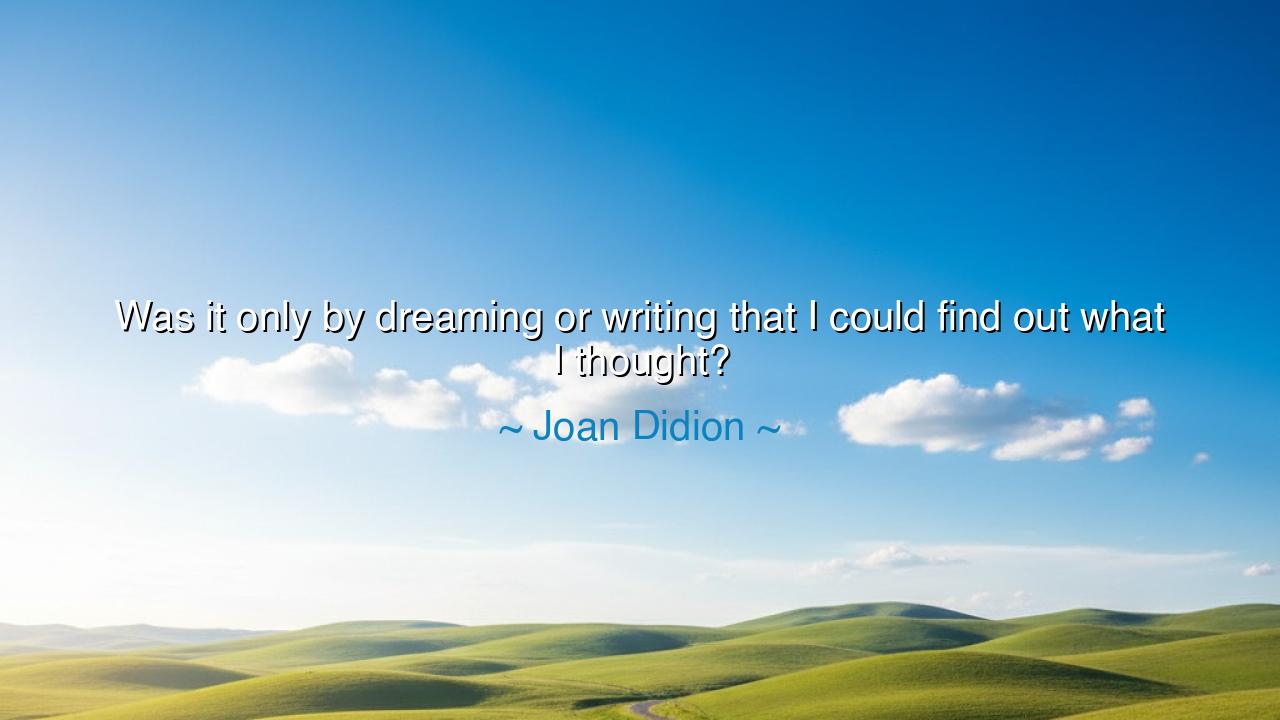
Was it only by dreaming or writing that I could find out what I






The words of Joan Didion — “Was it only by dreaming or writing that I could find out what I thought?” — rise like a whisper from the deep chambers of the soul. In them lies a truth both intimate and universal: that human understanding does not always emerge from logic or speech, but from the act of creation, from the mysterious spaces where thought becomes image, word, or dream. Didion, one of the great chroniclers of the modern human spirit, wrote not to proclaim what she knew, but to discover it. Her question is not rhetorical; it is an awakening — the realization that the path to self-knowledge often winds through the inner landscapes of imagination and reflection.
For Didion, writing was not simply expression; it was revelation. She once confessed that she did not know what she thought until she wrote it down — that her sentences were not reflections of thought, but the crucible in which thought was born. And so her quote becomes a mirror for all who seek to understand themselves: that we do not truly know what we believe, desire, or fear until we dare to translate the unspoken into form. Whether through the dream or the page, we confront the truths that dwell beyond the surface of our conscious mind. The dream is the mind’s night voyage; the writing, its daylight pilgrimage — both seeking the same destination: understanding.
The ancients knew this, too. The philosophers of Greece and the poets of Asia alike spoke of dreaming and art as sacred doors to the soul. Plato called dreams “the reflection of truth seen dimly through the mist of mortality,” while the Chinese sages of old believed that the spirit left the body each night to wander the realms of meaning. Likewise, the scribes and prophets wrote as though guided by a voice not entirely their own — as if writing itself were an act of communion between the mortal and the divine. Didion, standing in this long lineage, reminds us that through creation, we come to see not only the world, but ourselves.
Consider Virginia Woolf, another voyager of the inner world. Like Didion, she wrestled with chaos through the act of writing. Her journals were not tidy reflections of mastery, but storms of uncertainty — places where she tested the boundaries of her own thought. “Arrange whatever pieces come your way,” she once wrote, and in those arrangements, she found herself. Her brilliance was not born of certainty, but of exploration — of daring to write what she did not yet understand. So it is with every seeker of truth: the page becomes the map, and the hand that writes becomes both pilgrim and guide.
To dream and to write, then, are not luxuries — they are acts of survival for the soul. In dreaming, the unconscious reveals what the waking mind cannot bear to say. In writing, those shadows are brought into light, shaped into words that give them meaning. Together, they form the eternal dialogue between the seen and the unseen, the known and the unknown. Didion’s question — “Was it only by dreaming or writing that I could find out what I thought?” — is not one of confusion, but of awe. She marvels at how truth emerges not through will, but through surrender, through allowing the mind to wander where reason cannot.
Her reflection is also a warning for the modern world — a world too quick to speak, too hurried to listen inwardly. Many today mistake noise for thought and expression for understanding. But Didion teaches us to slow down, to listen to the murmur within, to give our thoughts the time to take form through dreaming, writing, or any act of quiet creation. For only when we give shape to the formless do we come to know what truly stirs beneath our surface. The one who writes, dreams, paints, or prays does not merely record their mind — they discover it.
So, O seeker of meaning, learn from the wisdom of Joan Didion. Do not fear uncertainty; instead, enter it with pen or dream in hand. When confusion clouds the heart, write — not to instruct, but to uncover. When words fail, dream, for in dreams the soul remembers what the mind forgets. Let your creations be your mirror, your compass, your confession. For in the act of creation, you will not only express thought — you will find it, as Didion did: shaped not by certainty, but by courage, by patience, and by the quiet adventure of listening to your own soul.






AAdministratorAdministrator
Welcome, honored guests. Please leave a comment, we will respond soon